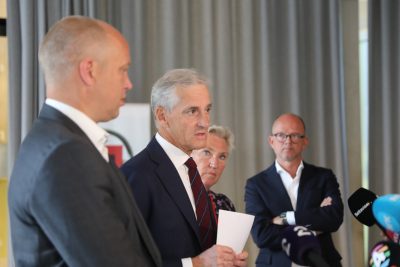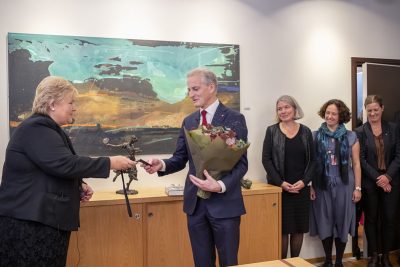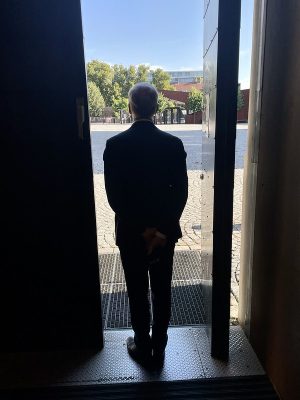NEWS ANALYSIS: Prime Minister Jonas Gahr Støre is on the defensive after his Labour Party has once again crashed in public opinion polls. His government coalition partner, the Center Party, is also in trouble with voters, with commentators suggesting the devastating poll results reflect a leadership problem rather than just unhappiness over soaring electricity rates.

That’s because the opposition leader in Parliament, Erna Solberg of the Conservatives, proposes a response to Norway’s much-debated electricity rates that’s quite similar to the Labour-Center government’s. Commentators including Kjetil B Alstadheim in newspaper Aftenposten have noted how both include the state compensation offered to households that Støre and Vedum ushered in last winter and, now, proposals for compensation to businesses that also are suffering from sky-high electricity bills. Solberg proposed business compensation much earlier than Støre did, and the Conservatives are keen to usher it in faster than the government is, but the goal is the same: relief for companies and preservation of the jobs they offer.
Speculation is thus flying over why Solberg’s Conservatives have logged huge gains in recent polls, clearly at the expense of Labour and Center. Newspaper Dagsavisen was the first to report last week how voters were “fleeing” from Labour and Center and shifting their support to the Conservatives (Høyre). The poll conducted by research firm Opinion that Dagsavisen had commissioned along with news bureau ANB and FriFagbevegelse left Solberg with 29.1 percent of the vote, with Labour crashing to just 19.3 percent and Center down at 6 percent. That’s a huge decline from last fall, when Labour and Center won the election with 26.3- and 13.5 percent respectively.
Center has lost more than half its voters since, and the results were reinforced in another poll this week conducted by research firm Norstat for state broadcaster NRK and Aftenposten. It shows Labour with just 19.4 percent and Center with 5.9 percent, similar to the results of yet another poll by newspaper VG. In all, three, Labour had less than 20 percent of the vote and the two government parties combined have less voter support than the Conservatives alone at or around 30 percent.
It’s a major blow, if not an embarrassment, to Labour and Center, both of which are also suffering from internal party quarreling and power struggles. “A divided and weak government on the defensive is clearly not what people want in crisis times,” wrote commentator Hege Ulstein in Dagsavisen. That harsh assessment came just before the leaders of all nine parties represented in Parliament gathered for a nationally televised debate Thursday evening in Arendal, where this year’s annual political and social event known as Arendalsuka was wrapping up.
Støre and Vedum have tried to explain away their poor showings in the polls by noting how they’ve been forced into crisis management mode ever since they took over from Solberg, who’d served as prime minister since 2013. The Corona crisis flared up again last fall and winter, electricity and fuel prices were already climbing and then Russian President Vladimir Putin invaded Ukraine, bringing war to Europe again. Now they’re facing an energy price crisis, if not an energy crisis itself, along with a sudden spike in the inflation rate that prompted the central bank to raise interest rates again on Thursday.

None of that is popular with voters, and whoever is in office gets the blame. In this case, though, Solberg couldn’t offer much different than Støre and Vedum are, leaving her sudden jump to 30 percent of the vote (from an election result of just 20.4 percent) a bit baffling. Ulstein thinks it comes down to how a government and prime minister tackle tough times.
“In other words, this is also about Støre’s leadership,” she wrote, noting how unusually high energy prices are splitting the government and Labour itself. Støre’s old rival within Labour, Trond Giske, seems to be mounting a surprising comeback even after having to resign in shame over sexual harassment charges well before the election. He’s openly challenging Støre’s leadership, while Støre also has a history of wavering on issues, and lately giving in the Center Party. He’s been criticized for first defending electricity exports to Europe and then backing down on such support, if reservoir levels tied to hydroelectric plants fall below a certain level. He also opposes a cap on electricity rates, yet his government was evaluating a so-called “max-price” last month.
“That inspires the opposition,” according to Ulstein. “When will Støre, as prime minister and party leader, stand forward with authority and show who’s boss?”
Solberg, meanwhile, is as secure in her leadership role as any top politician can be. She’s unrivalled within her party, managed to keep her own minority coalition government in power for eight years and won widespread public respect for her handling of the Corona crisis. Voters grew weary of Corona by election time last year, though, and few governments are re-elected twice. Now, according to the polls, she would lead a solid majority in Parliament.
“Good public opinion polls inspire everyone in the party,” she told NRK before Thursday night’s debate, which concentrated almost solely on the reasons for high electricity rates and various proposals for addressing them. She thinks her party lost voters last year for “strategic reasons” behind various coalitions, “so we hope we have won them back, and others.”
Both Støre and Labour Party Secretary Kjersti Stenseng are worried about their poor showing, with Stenseng calling their poll ratings “much too low for Labour. We of course have ambitions … at the same time, we understand these are tough times for many.” Støre has been warning about such for the past year.
Støre has also been under pressure and criticism from his party’s local politicians over reversal of forced municipal and county mergers, and from Norway’s largest trade union federation LO, which was disappointed that Labour and Center didn’t go along with enough demands from the Socialist Left Party (SV) to bring it into the coalition government. That left Labour and Center with a minority coalition dependent on SV for support. LO also challenged the government by supporting a ban on nuclear weapons, something difficult for Norway as a member of NATO to accept no matter who’s in power.
Then came a new survey published in newspaper Klassekampen on Friday. It shows that fully 66 percent of those questioned don’t think Støre’s government is handling the electricity situation well. Not even Labour’s own mayors around the country are satisfied, and worry that some companies will go out of business because of bills four times what they were just two years ago.
As if that weren’t enough, another new survey this week indicates that fully 49 percent of voters prefer Erna Solberg as prime minister, while 31 percent prefer Støre. The survey was conducted by Norstat for NRK, and Støre admitted the numbers were “tough,” but he attributed it to all the crises “that affect people.”

“The signal from voters is clear,” Gjesdal Mayor Frode Fjeldsbø told Klassekampen. “The government is not on the ball. We have to take this seriously.” Reports were emerging Friday that Støre’s government will propose compensation for businesses that will forbid them from doling out dividends while receiving government support. That’s also what employers’ organization NHO supports as well, so there may be majority in favour of that during an extraordinary session of Parliament on the issue next month.
Center Party leader Trygve Slagsvold Vedum is under similar pressure to provide electricity bill relief from his rural-oriented constituency who often demand government subsidies and, now, compensation for the high electricity bills. Labour and Center themselves often disagree on energy policy, prompting commentator Frithjof Jacobsen in newspaper VG to speculate earlier this summer that perhaps Center will use the energy crisis as an excuse for leaving government, going back to the opposition in Parliament and rebuilding voter support. Center, often accused of being populist, has performed better in opposition than in position and could then freely criticize and complain without being responsible for solutions.
Any government fall could usher in Solberg and her partners, backed by polls suggesting “a solid foundation for a change of government and a new non-socialist government,” as she told newspaper Aftenposten after the poll showing her party with 30 percent. She’s made it clear she’s ready to take over again if Støre’s government were to fall.
That’s not ideal, however, with war raging in Ukraine and Putin keen to seize on any sign of division or lack of unity within western democracies. Many had breathed a sigh of relief that Støre was in fact prime minister when Putin invaded Ukraine, since Støre has solid international experience as a diplomat and foreign minister in his predecessor Jens Stoltenberg’s governments. Støre is also multilingual and widely viewed as highly intelligent. Such assets don’t, however, always help in brutal party politics. Støre nonetheless seems intent on riding out the storms and has denied that cooperation within his government has soured.
“We know that we’re heading into a year that will demand a lot from us,” Støre told NTB. “Norway is a small country surrounded by quite rocky seas. We have good resources to get through this with a soft landing, but I think I will be using every opportunity I have to stress that we’re facing a very tough year ahead.”
NewsinEnglish.no/Nina Berglund

